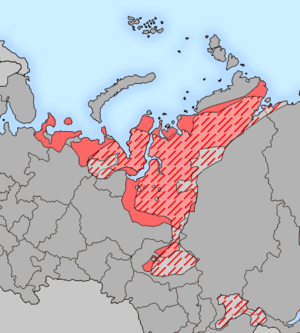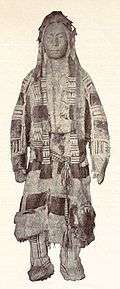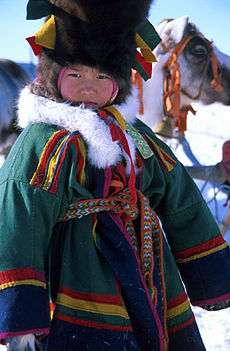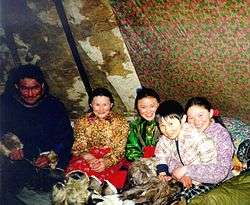Samoyedic peoples
The Samoyedic people (also Samodeic people)[1] are a group of closely related peoples who speak Samoyedic languages, which are part of the Uralic family. They are a linguistic, ethnic and cultural grouping. The name derives from the obsolete term Samoyed used in Russia for some indigenous people of Siberia.[2][3]

Peoples
Contemporary
| People | Group | Language | Numbers[4] | Most important territory | Other traditional territories |
|---|---|---|---|---|---|
| Nenets | Northern Samoyeds | Nenets language | 45,000 | Yamalo-Nenets Autonomous Okrug | Nenets Autonomous Okrug |
| Enets | Northern Samoyeds | Enets language | 200–300 | Krasnoyarsk Krai | |
| Nganasans | Northern Samoyeds | Nganasan language | 900–1000 | Krasnoyarsk Krai | |
| Selkups | Southern Samoyeds | Selkup language | 3,700 | Yamalo-Nenets Autonomous Okrug | Tomsk Oblast |
Extinct
- Yurats (Northern Samoyeds)[5]
- Kamasins or Kamas (Southern or Sayan Mountains Samoyeds)[5]
- Mators or Motors (Southern or Sayan Mountains Samoyeds)[5]
The largest of the Samoyedic people are the Nenets, who mainly live in two autonomous districts of Russia: Yamalo-Nenetsia and Nenetsia. Part of the Nenets and most of the Enets and Nganasans used to live in Taymyria autonomous district (formerly known as Dolgano-Nenetsia), but today this area is a territory with special status within Krasnoyarsk Krai. Most of the Selkups live in Yamalo-Nenetsia, but there is also significant population in Tomsk Oblast.
Gallery
 A group of Samoyeds around a campfire (1914)
A group of Samoyeds around a campfire (1914) Samoyed winterdress (before 1906)
Samoyed winterdress (before 1906) Nenets child
Nenets child Nenets family
Nenets family_(14595270719).jpg) A reindeer herd in Kolguyev Island in 1895.
A reindeer herd in Kolguyev Island in 1895.
References and notes
- Some ethnologists use the term 'Samodeic people' instead 'Samoyedic', see Balzer, Marjorie (1999). The Tenacity of Ethnicity. Princeton University Press. p. 241. ISBN 978-0-691-00673-4.
- [T]he term Samoyedic is sometimes considered derogatory in Balzer, Marjorie (1999). The Tenacity of Ethnicity. Princeton University Press. p. 241. ISBN 978-0-691-00673-4.
Samoyedic derogatory.
- "Samoyeds" had no derogatory meaning and represents a modification of the expression same-edne in Arctic Institute of North America (1961). Anthropology of the North: Translations from Russian Sources. University of Toronto Press. p. 219.
- Demoskop Weekly No 543-544
- Unesco Red Book on Endangered Languages
External links
